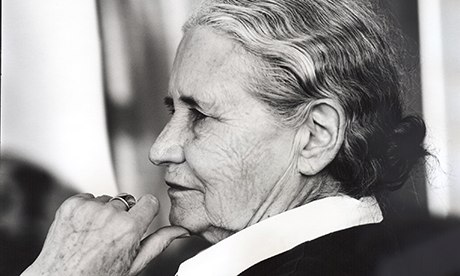Feminist Fiction
Building on my research into British novelists Jeanette Winterson, Marina Warner, Doris Lessing, Maggie Gee and Ali Smith, in the Autumn semester of 2012 I will be contributing to the team-taught MA module on the University of Lincoln's MA in 21st Century Literature, "Women Writing the 21st Century."
I'll be taking 2 seminars as part of the "Looking Forward" section of the module – Jeanette Winterson's The Stone Gods (Hamish Hamilton, 2007) and Maggie Gee's The Flood (Saqi, 2002) (see Dr Sarah Dillon's excellent article on The Flood here). What I find so interesting about Gee's satiric critique of capitalism in the near-future London of The Flood is that it prepares us for the revelation that it is not the dystopian, foetid floodwaters that most frighten the novel’s characters but, rather, the manifest poverty of the dilapidated Towers.
In my research, I am exploring the possibilities of co-evolutionary or reciprocal futures in post-apocalyptic imaginaries (particularly those that draw on, and extend, the pastoral mode). Whilst it is a novel with many flaws, I think Jeannette Winterson's The Stone Gods offers a more fully-imagined mode of “embodied,” co-evolutionary agency in the posthuman relationship between Billie and the Robo sapiens Spike, who contains the ingredients for humanity’s “second chance.” Spike offers an alternative posthumanist future of sentient technological evolution in love with the human, stretched across a transmigrational arc of galactic duration. However, the “repeating world” of Winterson’s transmigrationally-recurring time of human history forecloses Spike’s solar-powered and self-repairing posthuman futurity, living peacefully alongside nature.
Other writers covered in the module will include: Carol Ann Duffy, Patience Agbabi, Jo Shapcott, Jackie Kay, Sarah Waters, Nalo Hopkinson and Margaret Atwood.
Image by Garoa under a CC BY license.







 Dr Caroline Edwards is Senior Lecturer in Modern & Contemporary Literature at Birkbeck, University of London. Her research and teaching specialisms are in 21st century literature and critical theory, science fiction and post-apocalyptic narratives, Marxist aesthetics, and utopianism.
Dr Caroline Edwards is Senior Lecturer in Modern & Contemporary Literature at Birkbeck, University of London. Her research and teaching specialisms are in 21st century literature and critical theory, science fiction and post-apocalyptic narratives, Marxist aesthetics, and utopianism.
Follow / Contact